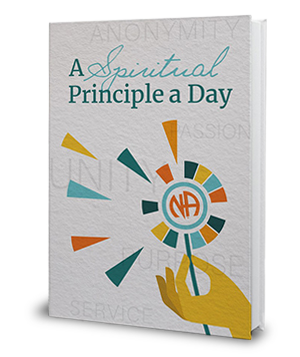Welcome to Narcotics Anonymous of NJ. Our Message Is…
That an addict, any addict can stop using drugs,
lose the desire to use, and find a new way to live.
Helpline
If you feel you have a problem with drugs, call our helpline
Events
See upcoming NA events and activities in NJ
Narcotics Anonymous is a nonprofit fellowship or society of men and women for whom drugs had become a major problem. We are recovering addicts who meet regularly to help each other stay clean.
– Narcotics Anonymous Basic Text, page 9
Recovery from addiction is possible and available through the 12 Steps and 12 Traditions of Narcotics Anonymous.
Narcotics Anonymous is FREEDOM from active addiction.
Narcotics Anonymous is an international, community-based association of recovering drug addicts with over 61,000 weekly meetings in over 131 countries worldwide.

Just for Today
We've sometimes heard it said in our meetings that "rude awakenings lead to spiritual awakenings." What kind of rude awakenings do we have in recovery? Such an awakening might occur when some undesirable bit of our behavior that we thought safely hidden away is suddenly revealed for all the world to see. Or our sponsor might provoke such an awakening by informing us that, just like everyone else, we have to work the steps if we expect to stay clean and recover.
Most of us hate to have our covers pulled; we don't like being laid naked in full view. The experience delivers a strong dose of humility. Our first reaction to such a disclosure is usually shock and anger, yet we recognize the truth when we hear it. What we are having is a rude awakening.
Such awakenings often disclose barriers that block us from making spiritual progress in our recovery. Once those barriers are exposed, we can work the steps to begin removing them from our lives. We can begin experiencing the healing and serenity which are the preludes to a renewed awakening of the spirit.
A Spiritual Principle a Day
Addicts are perceptive people, or so we like to think. When we were using, we could go somewhere we'd never been and easily find either a way to get drugs or someone to use with. Our intuitions and insights often serve us well in recovery, especially as the Steps help us to improve our ability to discern between the voice of self-will and that of conscience. Learning the difference can be a challenge since the disease talks to us in our own voice. Freedom from our disease depends on it. With practice and the help of other recovering addicts, we improve our connection to our intuition and our conscience. We gain the freedom to make better choices, and our lives improve.
Trusting in the process--and in our conscience--can be scary. How can putting down the drugs make the obsession go away? How can we be sure our sponsor won't share our inventory with everyone? What happens if we let go of that defect that has been protecting us? We just don't like not knowing.
Step Two in our Basic Text tells us, "We can use this Power long before we understand it." One member shared, "I've been staying clean on a Higher Power that I don't understand for over 25 years, and I'm starting to get okay with never knowing. It still works!"
No matter how perceptive we are, our perception is limited. There are wavelengths of light not visible to the human eye, pitches of sound not perceptible to the human ear. We cannot know the totality of things. When we get okay with not knowing, we can shift our focus to what we do feel, sense, and perceive in the present. We are free to be right here, right now.

